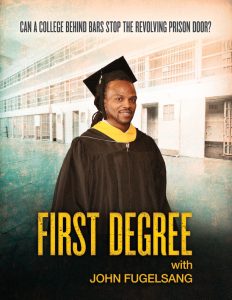First Degree will be followed by a group discussion
Southern Arkansas University’s Department of Behavioral and Social Sciences and the cri minal justice program will host a preview screening of First Degree, a new film about a college behind bars that prevents released inmates from returning to prison, before it airs on PBS at 1 p.m. on Thursday, April 28, 2016, at the Reynolds Center Foundation Hall.
minal justice program will host a preview screening of First Degree, a new film about a college behind bars that prevents released inmates from returning to prison, before it airs on PBS at 1 p.m. on Thursday, April 28, 2016, at the Reynolds Center Foundation Hall.
The documentary presentation will be followed by a group discussion.
The expression, “sent up the river,” was coined by individuals who were sent up the Hudson River to do their time at the infamous Sing Sing Prison in Ossining, New York. First Degree finds hope in this seemingly hopeless place by exploring an unusual prison education program that appears to keep Sing Sing inmates from being sent back up the river after their release.
Nationwide, more than half of released inmates return to prison within five years. However, for the past 14 years, less than 1% of the inmates who earned their college degrees at Sing Sing returned to prison.
There is an undeniable link between education and person’s likelihood of becoming criminal. Empirical studies support that inmates who take advantage of educational opportunities while they are incarcerated are less likely to recidivate. Recidivism is one of the unfortunate pitfalls of mass incarceration.
“After completing a recent documentary about capital punishment, I wanted to address another timely criminal justice issue – mass incarceration. America has 5% of the world’s population but 25% of the world’s prisoners,” says Director Roger Weisberg. “Since launching the war on drugs in the 1970s, there has been a 700% increase in our prison population. The land of the free is now the world’s biggest jailer with almost seven million Americans in prison, in jail, on probation or on parole. If our prisons were effectively rehabilitating inmates and making our communities safer, it might be possible to justify the 75 billion dollars a year we spend on mass incarceration, but our prisons do an abysmal job of preparing inmates for productive lives once they return to their communities. Over three quarters of released inmates are re-arrested within five years, and over half return to prison.”
Nationwide, every dollar spent on prison education programs saves five dollars on re-incarceration costs. But, Weisberg points out, Congress withdrew prison education funding in 1994 and the number of prison college programs dropped from 350 to about a dozen. Weisberg’s hope is that First Degree can help the public realize that prison education saves money as well as lives.
First Degree is the 32nd documentary produced and directed by Roger Weisberg for national public television. His previous films have earned more than 150 awards including an Emmy, DuPont-Columbia, and Peabody awards, as well as two Academy Award nominations. First Degree builds on this extensive body of work and represents the culmination of nearly four decades of reporting on ways to remove barriers and expand opportunities for disadvantaged Americans.
For further information about First Degree, visit http://www.pppdocs.com.
